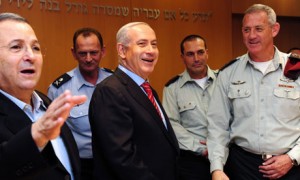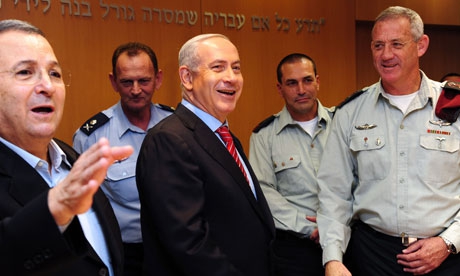
Iran has shown itself amenable to diplomacy, while Israel's security establishment advises against military intervention
Now that the crisis over Israel's bombing of Gaza has been defused with a�ceasefire brokered by Egypt and the United States, it will soon be time for the world to turn to the Middle East's "other" thorny problem: Iran's nuclear programme.
There are parallels between the two situations. Western suspicions that Iran is trying to build an nuclear arsenal are matched by its suspicions and hostility towards Hamas, and the view that both are wild, ideologically obsessed, irrational actors. The ceasefire shows Hamas is rational and pragmatic. In both cases, Israel's extreme positions and preference for military force stand out. And, as in Gaza, so in Iran, the US could do with diplomatic mediation by a third party that has friendly relations with Iran.
Barack Obama rightly resisted Israeli pressure for military action against Iran and hinted at the possibility of bilateral talks with Tehran � for the first time since 1979. His re-election and acceptance speech call for moving "beyond this time of war" has opened up new possibilities for a diplomatic settlement which caps Iran's uranium enrichment programme to non-weapons grade levels while affirming Iran's right to peaceful uses of nuclear energy under the�Non-Proliferation Treaty. Two years agoTurkey and Brazil mediated such a deal. Today, India could.
Now is the right time for a major diplomatic initiative, for three reasons. First, the Gaza ceasefire and Obama's re-election, which makes a military attack improbable, have produced considerable relief in Iran. The former Iranian ambassador to the UN ,Sadegh Kharazi. recently praised Obama for "reducing tensions between Islam and the west" and trying to "move closer to Iran".
Second, the limited utility and extremely high risks of an attack on Iran have become apparent even to hard-nosed hawks in the US and Israel. The Israeli prime minister Binyamin Netanyahu's calls for an attack were strongly opposed by his cabinet colleagues and Israel's security establishment, including serving army chief Benny Gantz, former Shin Bet (security agency) chief Yuval Diskin, and former intelligence (Mossad) head Meir Dagan.
Similarly, more than 30 former top US foreign policymakers and military officers (including three national security advisers and two central command heads)�have warned against military intervention.
They argue an Israeli attack would delay Iran's nuclear programme at best by two years. A much bigger US "military action involving aerial strikes, cyber-attacks, covert operations, and special operations forces would destroy or severely damage many of Iran's physical facilities," but "complete destruction of Iran's nuclear programme is unlikely; and Iran would still retain the scientific capacity and the experience to start its nuclear programme again".
A strike on Iran would produce a conflagration in the Middle East. Iran has strong militias like Hezbollah, and 2,200 km-range missiles which can reach US bases and Israel. An attack would be a huge political gift to Iranian hardliners and rally support for an ultra-nationalist platform. It will create resentment greater than the American-engineered overthrow of elected prime minister�Mohammad Mosaddegh in 1953, and further embitter the region's Persian and Arab youth against the west. Worse, it would guarantee that Iran rapidly becomes a nuclear weapons-state.
According to US intelligence agencies and Israeli army chief Gantz, Iran hasn't yet decided whether to acquire nuclear bombs. This will quickly give way to a hardline pro-nuclear consensus.
Third, campaigning for Iran's national elections, due next year, would soon close the window of opportunity for talks. Diplomacy can be pursued along a US-Iran bilateral "back-channel" and in the now-imminent negotiations between Iran and the P5+1 (the five permanent members of the UN Security Council, and Germany). Now that the drumming-up of the "existential threat" to Israel from Iran (while ignoring Israel's status as the Middle East's sole nuclear weapons-state, which has attacked other countries) has subsided, the P5+1 can adopt a reasonable line in the talks.
Iran's centrifuge-based enrichment programme is rather primitive and beset by technical problems. It's not easy to stabilise machines which spin at ultra-high speeds such as 800 revolutions per second. Iran's main centrifuges are believed to be based on a crude, highly breakdown-prone design of Pakistan's AQ Khan laboratories. Iran has also deployed a small number of somewhat more advanced centrifuges. But these need super-speciality steels and high-quality carbon fibre, which Iran cannot make nor buy under tough sanctions. Iran may be many months, if not a year or two, away from making enough enriched material for a bomb. Even hardliners agree that "an Iranian breakout in the next year could not escape detection" by the International Atomic Energy Agency or the US.
Iran has shown itself amenable to non-coercive diplomacy. India, with its history of friendly relations with Iran, including an anti-Taliban alliance in Afghanistan, could be helpful here. India voted against Iran at the IAEA under US pressure. But India gets a lot of its oil from Iran and wants improved relations with Tehran. A mediatory role, in keeping with India's regional standing, would help its bilateral relationship too.
The Iran Project is not responsible for the content of quoted articles.











